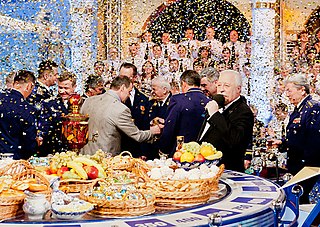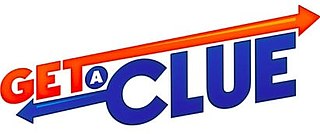
Balderdash is a board game variant of a classic parlour game known as Fictionary or the Dictionary Game. It was created by Laura Robinson and Paul Toyne of Toronto, Ontario, Canada. The game was first released in 1984 by the Canada Games Company. A US edition appeared that year from TSR, Inc., copyrighted to Gameworks Creations, Inc. and licensed from Canada Games. Subsequent editions have appeared from a variety of companies including The Games Gang, Hasbro and Mattel. The game has sold over 15 million copies worldwide to date. It is aimed at fans of word games, such as Scrabble.

Jotto is a code-breaking pen and paper word game for two players. Each player picks and writes down a secret word and attempts to guess the other's word first during their turn.

You Don't Know Jack is a series of video games developed by Jackbox Games and Berkeley Systems, as well as the title of the first You Don't Know Jack game in the series. You Don't Know Jack, framed as a game show "where high culture and pop culture collide", combines trivia with comedy.
iSketch was a drawing browser game that was similar to Pictionary. It was launched by Robert Wahlstedt on June 15, 1999, and was written in Adobe Shockwave. As of April 9, 2019, support for Adobe Shockwave was discontinued, and the game ceased to function correctly and has not been updated.

Now You See It is an American television game show created by Frank Wayne for Mark Goodson-Bill Todman Productions. The object of Now You See It is to answer general knowledge trivia questions by finding the answers hidden in a grid, similar to a word search puzzle.

Chain Reaction is an American television game show created by Bob Stewart, in which players compete to form chains composed of two-word phrases.

The Cross-Wits is an American television game show. Two contestants, each paired with two celebrities, competed to fill in words in a crossword puzzle. It premiered on December 15, 1975, and lasted for five seasons until its cancellation on September 12, 1980. The show was hosted by Jack Clark, with Jerri Fiala as hostess. Announcing duties were handled by John Harlan, Jay Stewart, and Jerry Bishop. The show was produced by Ralph Edwards Productions and distributed by Metromedia Producers Corporation.

Catch Phrase is a word guessing party game commercially available from Hasbro.

Wordplay is an American game show which ran on NBC from December 29, 1986 to September 4, 1987. It was hosted by Tom Kennedy, with Jamie Farr substituting for Kennedy for one week of shows, and announced by Charlie O'Donnell. The show was produced by Scotti Bros.-Syd Vinnedge Television in association with Fiedler/Berlin Productions and Rick Ambrose Television.
BrainTeaser was a British game show based on the original Dutch format of Puzzeltijd. The show was broadcast live, with phone-in viewer puzzles being announced and played during the show in addition to the studio game. During its run from 5 August 2002 to 7 March 2007, it aired on Five Mondays to Fridays, usually for an hour around lunchtime, and was fronted by various presenters rotating with one another. Beginning in August 2005, a version of the show that exclusively focused on viewer participation was broadcast in a four-hour long block on YooPlay TV every day after the Five broadcast, as part of a thirteen-week trial.

Blackout is an American game show that was broadcast on CBS as part of its daytime schedule from January 4, 1988 until April 1, 1988. The program was created and produced by Jay Wolpert. The game features two contestants, each paired with a celebrity. Contestants attempt to solve word puzzles consisting of a sentence or short paragraph with four blank spaces. Players guess each missing word based on hearing clues recorded by their partner, but with the playback being muted or "blacked out" at certain places by their opponent.

All-Star Blitz is an American game show that aired on ABC from April 8 to December 20, 1985, with reruns airing on the USA Network from March 31 to December 26, 1986. Peter Marshall was the host and John Harlan was the announcer for the series, which was produced by Merrill Heatter Productions, in association with Peter Marshall Enterprises.

The Field of Wonders is a Soviet, later Russian adaptation of the U.S. game show Wheel of Fortune produced by VID, provided with elements of Russian culture and hosted by Leonid Yakubovich.
Celebrity is a party game similar to Charades, where teams play against each other to guess as many celebrity names as possible before time runs out.

Dixit, is a French board game created by Jean-Louis Roubira, illustrated by Marie Cardouat, and published by Libellud. Using a set of cards illustrated with dreamlike images, players select cards that match a title suggested by the designated storyteller player, and attempt to guess which card the storyteller selected. The game was introduced in 2008. Dixit won the 2010 Spiel des Jahres award.
Ex Libris: The Game of First Lines and Last Words is a party game of literary bluff related to fictionary. First published in 1991 by the English board game company Oxford Games Ltd., Ex Libris was devised and compiled by Leslie Scott and designed by Sara Finch. The game involves having to write fake, but plausible, opening sentences of genuine books in an attempt to fool fellow players into believing your words are the authentic first lines of a given book.

Jackbox Games, Inc. is an American video game developer based in Chicago, Illinois, best known for the You Don't Know Jack series of quiz-based party video games and The Jackbox Party Pack series. Founded by Harry Gottlieb, the company operated as Jellyvision Games from 1995 until its closure in 2001. After seven years of dormancy, Jellyvision Games was revived in 2008, and the company rebranded as Jackbox Games in 2013.

The Jackbox Party Pack is a series of party video games developed by Jackbox Games for many different platforms on a near-annual release schedule since 2014. Each installment contains five games that are designed to be played in groups of varying sizes, including in conjunction with streaming services like Twitch which provide means for audiences to participate.

Get a Clue is an American television game show hosted by Rob Belushi that aired on Game Show Network from January 6, 2020 to April 16, 2021.

People Puzzler is an American television game show hosted by Leah Remini and broadcast by Game Show Network as well as in syndication. It aired from January 18, 2021 to November 3, 2023. The show is inspired by the celebrity and pop-culture themed crosswords in People magazine.
















